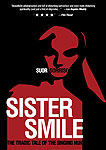Sister Smile (Suor Sorriso): The Tragic Tale Of The Singing Nun DVD
Published on January 18th, 2011 in: DVD, DVD/Blu-Ray Reviews, Feminism, LGBTQ, Movie Reviews, Movies, Music, Reviews, Teh Sex |By Hanna

Suor Sorriso, also known as Sister Smile, is a cult classic in a lot of ways; it has also served to revive interest in the real-life “Singing Nun,” also known as Jeannine Deckers. There has been a demand for Sister Smile on DVD for some time; many viewers will be watching this film for its position in cinema history. Whatever its cinematic merits, though, I found the almost entire lack of factual accuracy or congruency difficult to surmount.
For one thing, Sister Smile is set in the present (the film was released in 2002), while Jeannine Deckers was born in 1933 and died in 1985. For another, the main characters are played by actresses much younger and prettier than the real Jeannine Deckers and Annie her lover (“Clara” in the film), both of whom were fairly average, middle-aged Belgian lesbians. The film takes Deckers out of her lower middle class Belgian background; in it, she has one family member: a father who is decadent and corrupt, a symbol of wordly success. Finally, the whole film is set in Rome and not Belgium, which was obviously done in order to drench the film in Catholic symbolism, but for someone familiar with Belgium and Rome, this is very alienating.
However, factual accuracy is not the point of this film; rather, the point is to create a psychological journey.
This journey is very well done in Sister Smile. Jeannine’s psychological descent is symbolized in her dreams about descending into hell, and played out in episodes that may as well be dreams: she plays with paper doll versions of herself, goes back and forth between her father’s house and Clara’s, and has bouts of self destructive urges that emerge in drug abuse and willingly walking into risky sexual situations. In between, she runs into bits of Rome’s religious architecture like they’re obstacles in her life’s path. Her father doesn’t really serve as her father as much as he does a symbol of worldly possessions, desires, and vanity, and finally as established power that takes her artistic position away from her.
Clara is on the other side, a fixed point and a safe port in a storm of self loathing and guilt. Her work creates some meaning in both of their lives. At the end, the women are united in the touching suicide scene. They sit on their bed and eat pills and alcohol like they are receiving the host.
The unreality of these developments could be played up more, but otherwise are vivid and engaging in describing inner turmoil.
The film’s main problem is forgetting to ground that stormy, dark fantasy part in reality. Though it’s clear to me as someone who’s read about Deckers’ life that these things are not true and only serve as a graphic representation, other people won’t have a clue. Some of the motivations the film presents seem to have been true: Deckers’ frustration with the institution of the church and of the moneyed record companies; her drive to prove herself as an individual; the lack of artistic recognition; and her overbearing mother (absent from this narrative but symbolized in the father).
A lot of her real life problems, though, seem to have come from outside. There is no doubt in Belgian writing about Jeannine Deckers that the record companies, tax offices, the Church, and society (through its hatred of homosexuality) were the ones who caused a lot of her mental anguish and ultimately her suicide.
In the end, I don’t think this film gives Jeannine enough credit. She was a wonderful musician, who bravely left her religious convictions behind to become a feminist lesbian right at the start of the feminist movement in the Benelux. She did a lot of great work with autistic children, and her principles are still being used in works on this disorder.
Inside, she must have been about as much of a mess as this film makes her out to be, but she still achieved great things. Focusing on the mess and skipping over her success and achievements as Sister Smile does, skews its perspective and reduces its meaning.
Sister Smile (Suor Sorriso) was released by MVD Visual on December 7, 2010 and is available from See of Sound. The film is in Italian with English subtitles.
Time limit is exhausted. Please reload the CAPTCHA.